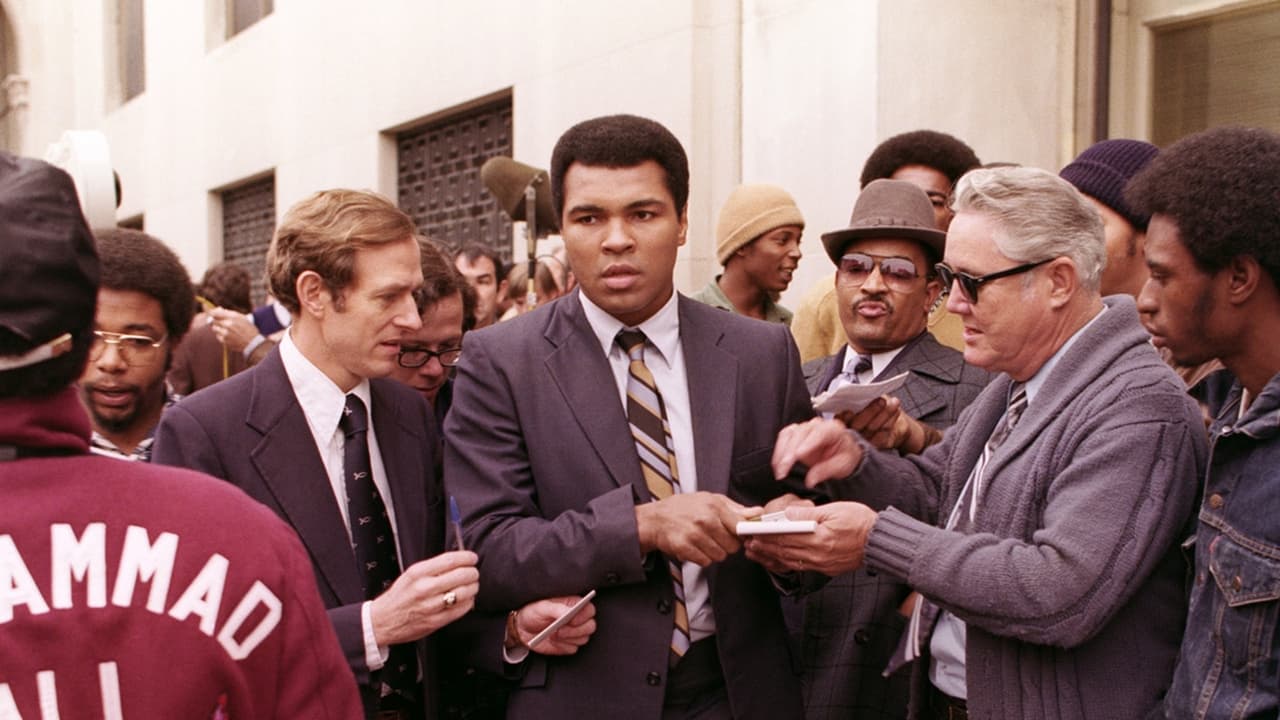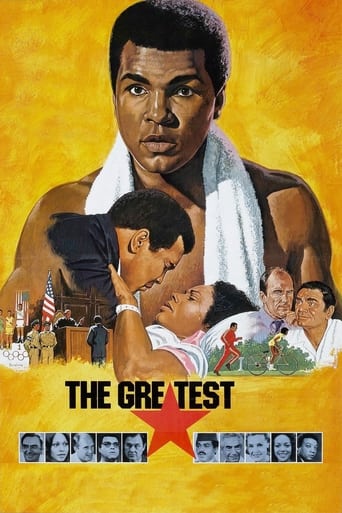

It should probably be a given that real life sports celebrities should never depict themselves in stories about their own life. Baseball star Jackie Robinson was called upon to do the same thing in a 1950 movie about his career up till then - "The Jackie Robinson Story". Quite unexpectedly, Robinson displayed a surprising lack of charisma portraying himself, no doubt due to the fact that he was probably very self conscious appearing on screen. The same can't be said of Cassius Clay/Muhammad Ali of course. I don't think anyone could ever accuse him of being camera shy, but this picture simply doesn't do the former champ justice.I say this with the hindsight of having grown up with Clay/Ali's name in the headlines virtually non-stop from the time he became a heavyweight contender and handed Sonny Liston that stunning defeat to become World Champion on February 25th, 1964. From that point on, the colorful boxer maintained a ubiquitous presence on front pages of the nation's newspapers with his prophetic poetry and outsized ego. The story here does touch on all that, with a whirlwind overview of his troubles with the government and the matches that brought him his second world title at the 'Rumble in the Jungle' in Kinshasa, Zaire against a formidable George Foreman.Notably absent from this biopic, and one I can't quite understand, was the omission of legendary sportscaster Howard Cosell, who followed Ali's career closely and became a close friend. With other members of Ali's inner circle portrayed by actors like Ernest Borgnine, John Marley and Lloyd Haines, Cosell's absence stuck out like a sore thumb for this viewer.One thing that the picture depicted that I was never aware of was the business with the young Clay throwing away his Olympic gold medal over a racial grievance. I can't imagine how that ever got by me, and so I questioned it's accuracy while watching the picture. An internet search revealed a story about someone finding the medal in the Ohio River some fifty four years later on June 21, 2014, thereby putting to rest any concerns that the story was fabricated by the loquacious Ali as a publicity stunt when it was revealed for the first time.Die hard Muhammad Ali fans will probably want to tune into this story, but on the flip side, die hard fans won't learn anything new, so the novelty would be in seeing Ali portray himself as a young man on his climb to becoming 'The Greatest'. Unlikely as it may seem, the 2001 film "Ali" starring Will Smith as the legendary champ is more inspirational than this one, and comes recommended for fans of the boxer and the man.
... View MoreThe original (and nominal) director here, Tom Gries, died of a heart attack while the film was still in production; somewhat perversely, Monte Hellman (who usually had to struggle to set-up his own personal projects) seemed like the go-to-guy in similar situations – since he would be assigned similar 'doctoring' duties on AVALANCHE EXPRESS (1979), whose own viewing preceded this one! While it was most probably green-lit in the wake of the boxing sleeper hit (and surprise Oscar triumph) ROCKY (1976), earlier in the decade another film on a black champ within this particular sporting field had emerged i.e. THE GREAT WHITE HOPE (1970) – in which James Earl Jones had been Oscar-nominated for his turn as Jack Johnson and who, here, turns up briefly as yet another controversial historical figure, Malcolm X (himself the subject of a 1992 film, where he would be interpreted by Oscar contender Denzel Washington).Anyway, it was a rarity to have the protagonist of a biopic played by the man himself; legendary Muhammad Ali – formerly known as Cassius Clay – 'performs' adequately enough under the circumstances (though some disparagingly opined that he was unconvincing!), so much so that he would later star in the made-for-TV American Civil War epic FREEDOM ROAD (1979). For the record, his life-story would also be treated in a number of documentaries, such as a.k.a. CASSIUS CLAY (1970) and the Oscar-winning WHEN WE WERE KINGS (1996) – both of which I own but have yet to check out – as well as Michael Mann's more thorough feature ALI (2001; for which star Will Smith would also be up for a Best Actor Oscar). Incidentally, the name-change was from Clay to Ali occurred when he changed his faith from Christianity (rejecting it for being "the white man's religion 'mandating' that the black man suffer while on Earth and reap his rewards in the afterlife"!) to Muslim (the boxer's association with the revolutionary Malcolm X would be frowned upon by his promoters, while Ali's pacifist views would land him in trouble with the authorities when he refused to be drafted in the Vietnam War, whereupon he was stripped of his titles!).Thankfully, the script (by sports authority Ring Lardner Jr. and an uncredited Bill Gunn, perhaps best-known for his radical take on the vampire theme with GANJA & HESS {1973}) does not whitewash its subjects, depicting Ali as misogynistic (liberally seducing white women and dominating those of his own color) and brash (openly aggravating his opponents in order to throw them off-balance) and Malcolm himself as delusional. The heavyweight bouts themselves are presented briefly via stock footage, with more time allotted to the 1974 "Rumble In The Jungle" with Ali making a spectacular comeback facing George Foreman (actually exclusively dealt with in the afore-mentioned WHEN WE WERE KINGS – by which time the protagonist would have become afflicted with Parkinson's Disease, though he did turn up unannounced at the awards ceremony!) and which ends THE GREATEST itself on a high note. Such powerful moments are intermittently felt throughout, but the end result does not really prove the compelling portrayal that was clearly intended! In fact, among its deficiencies, one has to include the movie's soundtrack – composed of equal parts sappy songs by George Benson (notably "The Greatest Love Of All") and a pulsating score (during the ROCKY-type training sessions) that are very evocative of its era, that is to say, feel dated at this juncture! Nor is the film helped in any noticeable way by the star-studded supporting cast – highlighting Ernest Borgnine (as Ali's trainer), John Marley (his doctor), Robert Duvall (the afore-mentioned flustered promoter), Ben Johnson (as an early supporter), a thinned-down Paul Winfield (as his defence counsel) and Roger E. Mosley (as Sonny Liston, the heavyweight champ he first lost to and then triumphed over).
... View More9?¬9?est (1977) was a bio-pic that starred Muhammed Ali as himself. This film was based upon a biography that was titled the same as the movie. Who else could portray the "Greatest of All Time" other than the man himself. The movie follows Ali from when he was known as Cassius Clay, winning the boxing gold medal, winning the World's Heavyweight Boxing title from Sonny Liston, refusing to be inducted into the military because of his deep religious beliefs and so on. How far does the film go into his life? You'll have to find out when you watch THE GREATEST!!I felt that Ali did a good job of portraying himself. I can't see any other person being able of doing the job. ALI, the movie just didn't do the man justice. It was filled with a lot of flaws and omissions. THE GREATEST may not be the best movie around, but if you want to see the man in all of his glory then you have to watch this movie. It was a real hoot to see Ali running his famous "Louisville Lip" and it was also nice to see Ali's inner circle of friends and confidants live and up close. I enjoyed this film much more than the overrated ALI.Recommended for boxing fans.
... View MoreThe saddest thing about this film is that the script simply didn't have a feel for Ali's poetry or style...what results is a low-energy, plodding plot with remarkably bad switches from fight scenes to scripted bits. A good movie to break in your fast forward button from fight scene to fight scene. Also look for a forty-something Ferdie Pacheco played by a 70+ year-old actor...remarkable.
... View More